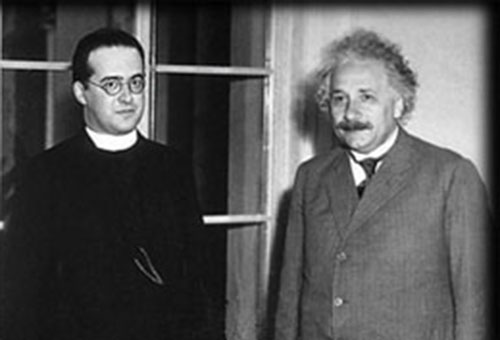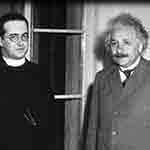
With yesterday’s editorial, Science vs Religion is back in the news:
If you based your life around a belief system that includes an account of the world’s creation in one of its founding stories, does that mean you are confusing your beliefs with science? It is a timely question. Contrary to what radical celebrity atheists like Richard Dawkins have claimed, it is not impossible for scientists to maintain a belief in evolution as well as a belief in God.
Georges Lemaitre was a fine example. A Belgian Catholic priest and astronomer, Lemaitre was also the father of the Big Bang Theory. He said, “As far as I can see, such a theory remains entirely outside any metaphysical or religious question”. For him, science and religion were parallel interpretations of the world.
But such nuanced views are rare. The debate between science and religion is usually characterised as fierce, polarised opposition between informed modernists who understand evolution and its implications and unsophisticated peasants who, so the stereotype goes, believe in fairy stories….
Remember that “Big Bang” was a put-down by Sir Fred Hoyle to mock the theory proposed by Belgian priest, astronomer, and professor of physics, Fr Georges Lemaître, that the universe had a beginning. The scientist Hoyle died in 2001 never accepting that the universe had a beginning. Hoyle understood intuitively what I wonder if Dawkins grasps, that everything that has a beginning… wait for it!… has a cause…
My cards on the table:
I have a Science degree and a Theology degree. I have taught Science. I have taught Theology.
I accept the current consensus position that the world is round, that there’s no dome, that the universe is about 13.7 billion years old, that we evolved…
I take the Bible too seriously to reduce it to poor History and bad Science. I take the Bible too seriously, this library of scrolls which evolved over a millennium, to treat all their contents as uniformly of one limiting genre.
Just as the Bible can’t answer: “how?”
So Science can’t answer: “why?”
I don’t believe in the “god” Dawkins doesn’t believe in either!
I have said before: evolution is the elephant in the empty nave.
So now I’ll list off the current NZ Anglican diocesan bishops who have stated their acceptance of evolution, Science, and the Big Bang (using APA referencing, I will indicate when and where their statement occurred so that you can read it for yourself):
If you know further such statements (and by this, as above, I’m including speeches, sermons, writing, etc), you might like to add to the above list of bishops’ statements accepting evolution in the comment section below.
If you appreciated this post, consider liking the liturgy facebook page, and/or signing up for a not-very-often email, …




I look at it like this Bosco: there is much ‘leap of faith’ in science as in religion, in that all the ‘answers’ are not known; in that I personally must trust to another’s complex instrument or explanation; in that ‘God’ involves many things to many people…
As for evolution, I’ll quote a once-popular Unitarian bumper sticker ( presumably aimed to all! )
-‘evolve, G__dammit’!
Best to you and yours, thanks for all you put out there,
Tracy
Amen to those points, thanks, Tracy. Blessings.
Your post raises questions which could/should be part of a wider conversation in churches. Including:
What is Scripture and how do we read it (= its many genres )?
To what extent is aversion to talking about evolution in public discourse a matter of fear (e.g. Of upsetting some members of our church, of then needing to spend inordinate time explaining why evolution is more likely to be true science than Creationism)?
What does it mean for our understanding of the God of Jesus Christ that the history of the universe is a history of evolution?
Then the question of what “the Fall” means in a world where death is a feature from the beginning of life?
Yes, Peter. But aren’t we coming 160 years late to the wider conversation you are suggesting? Blessings.